97 Main Street Belfast, Maine 04915
phone: 207-338-6575
e-mail: info@mainefarmlandtrust.org website: mainefarmlandtrust.org
RETURN SERVICE REQUESTED
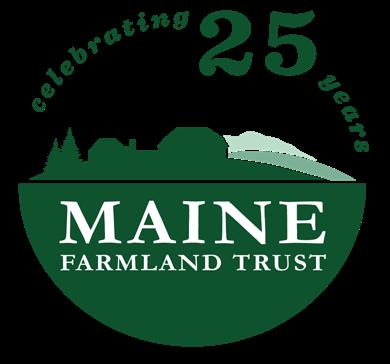
Celebrating our 25th year!
This year marks Maine Farmland Trust’s 25th anniversary. That’s a quarter century of working to create a brighter, more vibrant future for farming, powered by a member community that has helped us to:
• Protect 55,000+ acres of farmland across 379 farm properties in all 16 counties
• Connect 250+ farm seekers with farmland, keeping 25,500+ acres in active production as farmland changes hands
• Support 290 farms with financial and business planning and invest $1.4 million in grants to farmers to grow the success of their businesses
Just think of what we can accomplish in the next 25 years – and beyond! Please join us to grow a more vibrant and resilient future for farming.

A big thank you to our Fruit Level Business Members!
Growing Farms’ Climate Resilience
We’ve seen a lot of enthusiasm from Maine farmers to grow their farm’s climate resilience – but planning and implementation take time and resources, and every farm has unique climate risks and goals.
Thanks to a $1 million, 3-year grant through the 2022 TD Ready Challenge, our Climate Resilience Program has grown! This Spring we launched a suite of new and expanded farmer resources.
With our new Climate Impact Assessment Mapping Tool, farmers can get insights on potential risks that climate change might pose to a specific farm property. Farmers can use it to plan for the future of a farm they own or are considering buying, and we’re excited to use it ourselves to bring climate risk data and resilience planning into our Farmland Protection & Access, Stewardship, and other Farm Network programs.

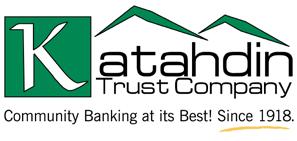

We awarded the first round of our new Climate Resilience Assistance Grants of $5,000 each to help 19 Farm Network farms respond to current climaterelated problems in ways that increase their future resilience.
“For our operation, continued investment in irrigation capacity and reliability is paramount to overcoming many of the challenges of a shifting climate and unreliable precipitation patterns. One cannot protect farmland without first

protecting the viability and health of farmers and farm operations,” said Eric Ferguson and Bethany Allen of Harvest Tide Organics in Bowdoinham, who plan to use their grant to install buried water lines, frost-free hydrants, and a mobile pumping station.
Later this year, farmers can apply to participate in the Climate Adaptation Planning program, which provides 3-6 months of one-on-one planning support to develop a climate adaptation plan that focuses on whole-farm resilience, from practices to infrastructure to landscape, and includes a $5,000 grant opportunity.
We are also participating as a partner organization in the Climate-Smart Farming & Marketing project led by Pasa Sustainable Agriculture. MFT will enroll Maine farms in the project and extend financial and technical assistance for implementing Climate-Smart practices. Last year this project received a $55 million USDA Partnerships for ClimateSmart Commodities award.
For more on MFT’s Climate Resilience Program visit our website
Climate Mapping at Six River Farm
After the heavy rains of 2023, water was top of mind as Nate Drummond and Gabrielle Gosselin of Six River Farm in Bowdoinham began to assess potential climate risks on their flat, soil-rich vegetable farm on the banks of Merrymeeting Bay. Walking the farm with MFT staff, Nate noted the areas where roads had washed out, but that overall the farm’s raised bed vegetable production system weathered the season’s rains. As they sat down to plan improvements to the farm road network, they pulled up the Climate Impact Assessment Mapping Tool. While its soils are generally well-drained, once the property does flood, its flat elevation means there won’t be any high and dry areas on the farm. The mapping tool reinforced that flooding is likely to recur, given precipitation and sea level rise projections, helping Nate & Gabrielle address these risks in their climate resilience planning.
1
NEWSLETTER Volume 22, No. 1 Spring 2024 97 Main Street, Belfast, ME 04915 509 Ocean Avenue, Portland, ME 04103 207.338.6575 mainefarmlandtrust.org
What’s inside: Building Climate Resiliency for the Future and more! READ MORE ONLINE: go.mainefarmlandtrust.org/newsletter 97 Main Street, Belfast, ME 04915 509 Ocean Avenue, Portland, ME 04103 207.338.6575 mainefarmlandtrust.org
mainefarmlandtrust.org/donate
Growing Farm-Friendly Local Policy Farmer Voices Driving PFAS Support & Research
Above photo: view from the fields at Six River Farm captured by Bridget Besaw

Evolving Economics at Willow Pond Farm
Jill Agnew of Willow Pond Farm in Sabattus has been farming for over 40 years and was the first in Maine to adopt the CSA model in 1989. The economics of farming weren’t easy then – and they’re still not easy now, as farmers face rising production costs and land prices, labor shortages, and changing markets. Over the decades, Jill has had to continuously adapt, and this year she is participating in MFT’s Business of Farming program to take a fresh look at her farm business model.
Willow Pond Farm, which Jill owns with her husband Charlie, became a Forever Farm in December 2022. The 35-acre farm, just minutes off of I-95, is home to two orchards (one organic) producing apples, plums, peaches, and pears, seven acres of organic vegetables and berries, a small flock of sheep, and in some seasons laying hens, pigs, turkeys, and broilers. “I like to do things for myself, I like to raise my own food. The evolution for me was making homesteading evolve into a farm business,” says Jill.
Initially selling at farmers markets, the labor, time spent off farm, and leftover produce each week weren’t working for Jill. After learning about CSAs at a farming conference, she decided to give it a go. “Nobody knew what the heck
Meet This Year’s Farm Business Cohorts
Accelerating Maine’s Farmland Protection
we were talking about. It was a totally different concept. But we got 35 brave, brave shares sold that year,” says Jill. Momentum grew, and now hundreds of CSAs exist in every corner of the state. The farm has been adapting ever since, adding a farm store (where you can find their incredible cider), selling apples wholesale, and raising pigs along with sheep for lamb and wool.
Analyzing her financials over the years has helped Jill see where she can adjust production and pricing to balance increased costs, and where she is constrained by the finite resources of land and labor. Through the Business of Farming program, Jill is exploring whether she might expand the hours of her roadside farm store, and will receive technical assistance and a seed grant.
“Maine is amazing at entrepreneurial farming – things can be small and still work, the quality is huge, and we have a supportive community,” reflects Jill. “In so many places, you can’t find local. As long as we have this in Maine, I would do everything we can to hold on to it.”
Above: Jill Agnew tends to her sheep. Below: Farmers discuss marketing strategies during a Business of Farming workshop.

Our Farm Network offers programs, tools, and technical assistance to support farmers in achieving their farm business goals to increase profitability and long-term sustainability. We’d like to introduce you to our 2024 Farm Business Planning participants:
Business of Farming A one year business planning program that combines workshops, technical assistance, and a small grant to implement new learning.
• 5 Star Nursery and Orchard (Brooklin)
• Caswell Farm (Gray)
• Eden Street Flowers (Bar Harbor)
• Foxfire Farm (Palermo)
• Golden Brook Farm (Camden)
• Hands Four Farm (Albion)
• Hart Farm (Holden)
• Jessiwayne Farm (Newfield)
• Lazy Acres Farm (Farmingdale)
• On the Mountain Farm (Warren)
• Paint Box Flower Farm (Orrington)
• Rainbow Farm (Orland)
• Seek-No-Further Farmstead (Monroe)
• Tiny Acres Farm (Montville)
• Willow Pond Farm (Sabattus)
Farming for the Long Haul A twoyear program for experienced farmers who want to dive deep into a business plan that considers long-term viability, with individualized technical assistance, peer learning, & a opportunity to apply for a $65,000 implementation grant.
• Dandy Ram Farm (Monroe)
• Meadowcroft (Washington)
• Old Crow Ranch (Durham)
The 2022 U.S. Census of Agriculture showed that 82,567 acres of farmland fell out of agricultural production over the last 5 years. Now more than ever, growing widespread support for farmland protection is critical to ensure that we have the land base needed to grow our agricultural economy, strengthen food security, and build resilience to climate change.
Less than 5 percent of Maine’s farmland is currently protected – this is lower than most states in the Northeast, and is the lowest amount by far of any state in New England. In order to keep our working lands available for agriculture and to secure more affordable access to farmland for Maine’s farmers now and in the future, we need to grow robust, efficient public programs and dedicated ongoing revenue for widespread farmland protection in Maine.
This Legislative session, MFT has engaged with state policymakers to strengthen the capacity and efficiency of the state’s Working Farmland Access & Protection Program. And as a member of the Maine Climate Council’s Natural and Working Lands Working Group, MFT’s VP of Programs Adam Bishop is working to shape recommendations to accelerate Maine’s farmland protection progress.
Growing MFT’s Farmland Protection Capacity

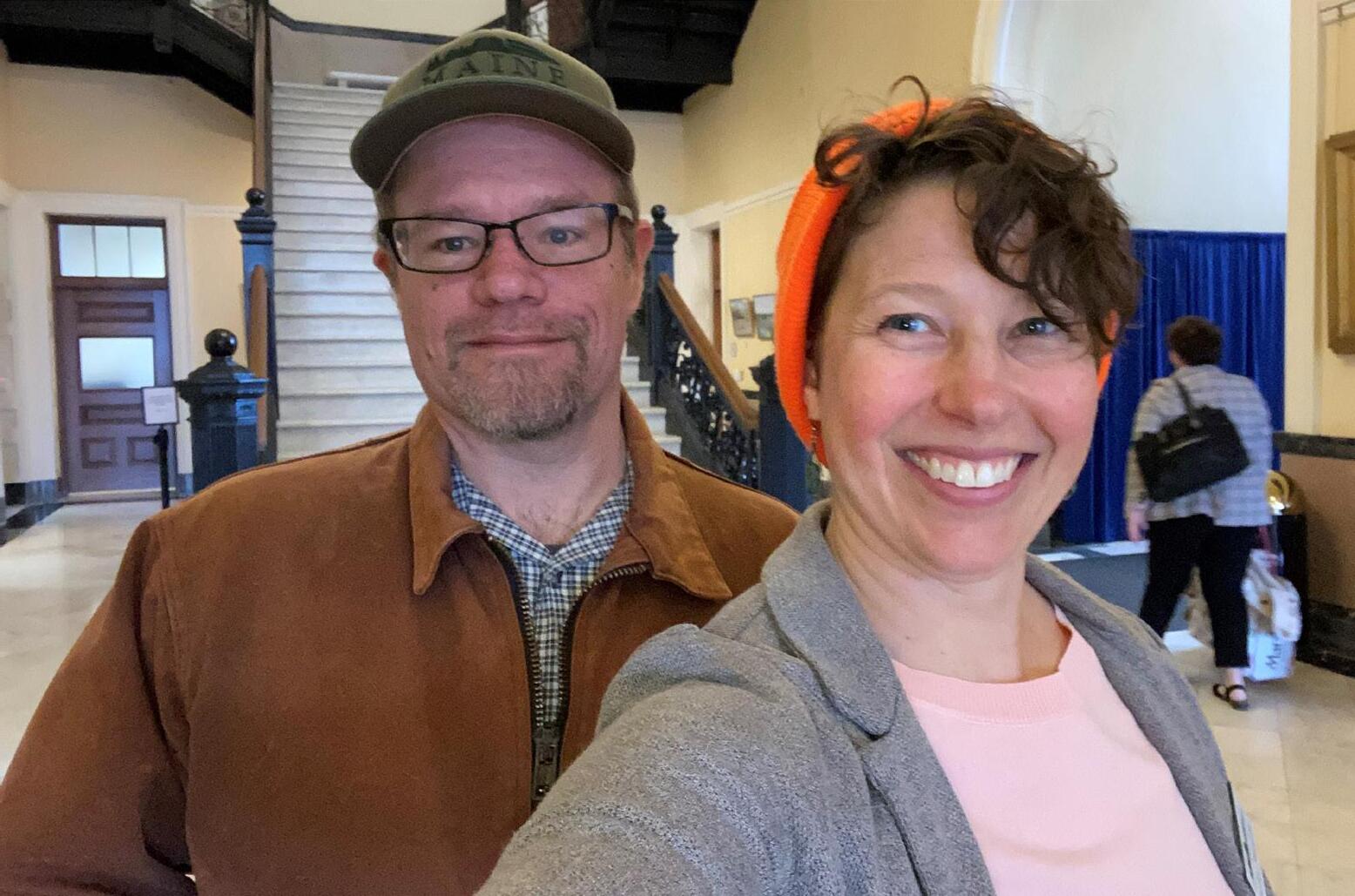
As we work to grow public resources for farmland protection, we are also working to grow MFT’s farmland protection resources. We are pleased to announce that Adam Bishop, who recently celebrated 10 years with MFT, has accepted a new role as the Vice President of Programs. Adam will continue to lead MFT’s Farmland Protection & Farmland Access program, with an added focus on growing resources to fund our easement, Buy/Protect/Sell, and other land transaction projects. Throughout the last decade at MFT, Adam has helped the organization to grow, evolve, and adapt to meet the changing needs of our agricultural community. With his wealth of knowledge and experience, in this new role, Adam will grow both MFT’s farmland protection & access strategy –and our capacity to carry it out.
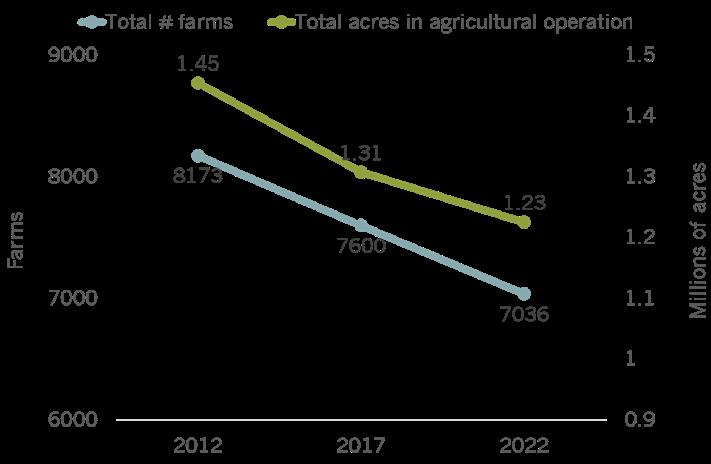
2 97 Main Street, Belfast, ME 04915 509 Ocean Avenue, Portland, ME 04103 207.338.6575 mainefarmlandtrust.org 5 97 Main Street, Belfast, ME 04915 509 Ocean Avenue, Portland, ME 04103 207.338.6575 mainefarmlandtrust.org
Percent of farmland protected 0-5% 11- 5% 16-2 % 20+% Maine 54,208 acres protected e mon 170 30 a e p e e N w Hamp h 17 382 c s p o ec ed Ma a hu e 75 037 c s o e e C nn c cu 47 998 a e p o c d Rhod a d 8 241 a e p e ed Sources: American Farmland Trust (2023), Status of State PACE Programs; American Farmland Trust (2020), Farms Under Threat: A New England Perspective; Maine Farmland Trust GIS analysis Farmland Protection Progress in New England
of farmland
the average farmland market value per acre increased by 44% since 2017.
Below: MFT’s Vice President of Programs Adam Bishop and Policy & Research Director Shelley Megquier at the Maine State House advocating for farmland protection. According to
the 2022 Ag Census, Maine lost 82,567 acres
and 564 farms, while

Talk of
the
Town: Q & A with Thacher Carter
MFT’s Municipal Policy Associate Thacher Carter offers support, provides resources, and advises municipalities on agricultural considerations. We sat down with him to talk about what his work looks like.
Why is municipal policy important?
In Maine, towns are granted a large amount of home rule authority, so they have a lot of say and power in terms of their budget and land use planning. Farmland across the state is being lost to all types of development. By proactively developing ordinances that protect farmland, towns can help their community maintain the land base needed to sustain agriculture. Also, land uses are often designated as residential or commercial, but farming can be both, if farmers live on their farm. Because land use for agriculture is unique, and farmers have different needs than other residents, it’s important that municipalities approach policies that impact farms with care and consideration.
What kind of decisions are made at the municipal level?
In Maine, there is usually a select board or town/city council, elected by residents,
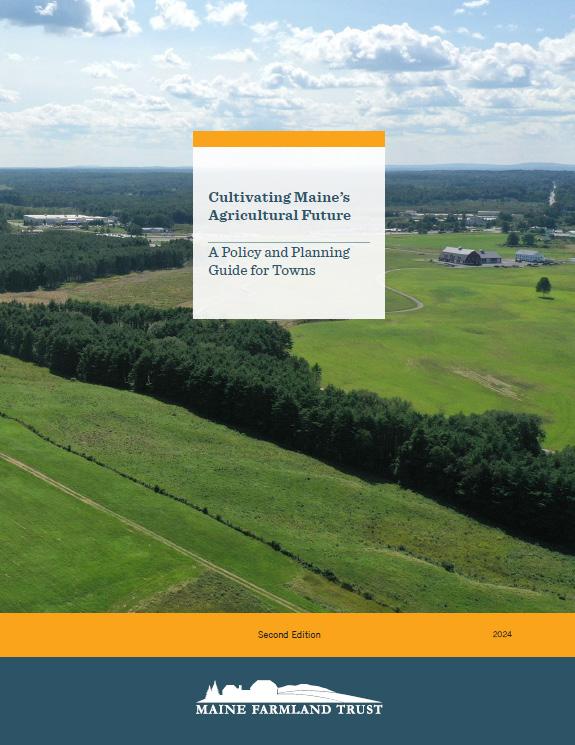
How Can You Help Farms in Your Town?
that makes decisions related to budgetary expenses and oftentimes land use decisions. Most established municipalities also have planning boards which review certain projects like large-scale commercial developments. At MFT, one way we’re supporting towns is by helping them establish agricultural commissions, made up of local farmers and farming advocates, to provide input to town councils on proposed changes to farmrelated ordinances. (There’s a section on this in the updated municipal guide!)
What types of technical assistance and consultation do you provide to municipalities?
I’ve been doing a lot of work with municipalities on surveys for comprehensive plans and providing feedback on comprehensive plan drafts.
Around every 10 years, many Maine towns adopt a comprehensive plan, a document that local ordinances and rules
must be consistent with. It’s important that municipalities incorporate strong agricultural provisions in comprehensive plans, because that will set them up down the line to have strong ordinances for farming. Recently, I’ve been working with two towns to survey local farmers and community members about agriculture so that their feedback can be considered in their town’s comprehensive plan.
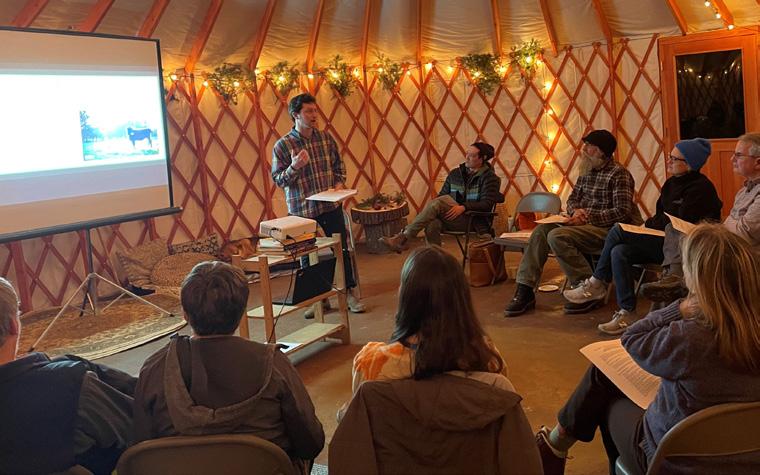

Farmer Voices Driving PFAS Support & Research
If you think your town could benefit from working with Thacher, contact tcarter@mainefarmlandtrust.org.
If you’re reading this, we’re willing to bet that you can easily name several farms in your town where you buy fresh produce or appreciate the landscape as you drive past. You might be surprised to know that your town’s policy and planning decisions have a big impact on protecting farmland from being lost to development, helping farm businesses thrive, and addressing the diverse needs and goals of farmers in the community.
You can help your town or city become more farm-friendly by sharing the newly-released second edition of Cultivating Maine’s Agricultural Future: A Policy and Planning Guide for Towns with your town officials and encouraging them to explore the resources within to support farming in your town. Produced in collaboration with the Maine DACF, the guide is an update to the original 2011 edition with updated information and lots of new content that reflects current issues including town examples and case studies.
Download the guide on our website – and check out our blog to watch recordings from our fivepart webinar series to learn more about how towns can support local agriculture. https://www.mainefarmlandtrust.org/future/policy-and-planning-resources-for-towns
Farmer voices are essential to designing effective PFAS supports and identifying priority research areas. Collaborative partnerships that center farmer perspectives have been critical to Maine’s response. As other states begin to grapple with PFAS contamination on farms, MFT is working to grow collaboration across state lines and sectors – with farmer experiences leading the way.
This past fall, MFT co-organized two convenings on PFAS in agriculture: a multi-day national symposium in Michigan and a regional meeting in Maine, bringing together hundreds of impacted farmers, policymakers, researchers, tribal representatives, and advocacy organizations to share learnings and research.
The symposium in Michigan began with an impacted farmer panel, where Maine farmer Adam Nordell joined farmers from Michigan, Colorado, and New Mexico to share how PFAS contamination has
and several Congressional staff made inquiries as they considered supporting legislation for PFAS relief and research.
upended their farms. As currently the only farm to have been shut down due to PFAS contamination in Michigan, cattle farmer Jason Grostic spoke of the devastating financial hardship and lack of support he has experienced over the last two years.
Maine dairy farmer Fred Stone spoke up from the audience, as a member of the Maine delegation, to share the parallels with his experience in early 2016. The two stories together emphasized the critical importance of a farmer safety net, and the impact that farmer stories have had in mobilizing Maine’s response.
The stories that impacted farmers shared in Michigan are already creating momentum for widespread farmer supports. Inspired by learnings from the conference, the Michigan Farm Bureau is pushing for a state farmer safety net like Maine’s. Michigan State University is now partnering with Grostic to use his farm and cattle for PFAS research, and the State of Michigan has purchased his cattle; however, much more support is needed for Grostic to recover from years of financial losses. (For more, read/listen to this story from Harvest Public Media.)
The stories have also sparked inter-agency discussions at the USDA, FDA, and EPA,
A few weeks later at the Maine regional meeting, farmer Sue Hunter led a tour of her Unity farm, where researchers from the University of Maine, Northern Tilth, and Purdue University are conducting on-farm experiments to learn how PFAS chemicals uptake in various parts of crops, whether adding biochar to contaminated soil might reduce crop uptake, and if “binders” added to contaminated forage could keep PFAS from entering livestock tissues. Farmers Egide Dostie II, Adam Nordell, Sue Hunter, and Fred Stone also shared their experiences and priorities on panel discussions about PFAS in animal production, policy & farmer supports, and reflections from the Michigan symposium. With farmer experiences and research needs at the center, momentum is growing in Maine for research on PFAS in agriculture – later this year, Maine’s $60 million PFAS Fund will launch programs to build a competitive research program, and Congress recently approved $17 million to establish a PFAS Center of Excellence at the University of Maine. And as the year-delayed Farm Bill approaches a vote once again, MFT is continuing to advocate for the inclusion of the Relief for Farmers Hit with PFAS Act (which has the support of Maine’s full Congressional delegation) to enact a nationwide farmer safety net and fund continued research.
You can help by sharing these farmer stories, especially with friends and family in other states, and let policymakers know that PFAS farmer supports and research are vital!
4 97 Main Street, Belfast, ME 04915 509 Ocean Avenue, Portland, ME 04103 207.338.6575 mainefarmlandtrust.org 3 97 Main Street, Belfast, ME 04915 509 Ocean Avenue, Portland, ME 04103 207.338.6575 mainefarmlandtrust.org
Above: Thacher presents on the topic of agricultural commissions to a group of farmers, agricultural advocates, and local officials in Durham.
Above: Sue Hunter (right) speaks about PFAS contamination & current research on her Farm in Unity.















